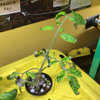Subject: ALERT: House and Senate will vote on bill to end organic
freemangreens
15 years ago
Related Stories

HOUSEKEEPING20 Things You Might Be Forgetting to Spring-Clean
Clean these often-neglected areas and your house will look and feel better
Full Story
HOMES AROUND THE WORLD9 Houses That Show Why Wood Is the Material of the Future
Most people may associate wood with traditional homes, but in these innovative, modern structures, its uses are really branching out
Full Story
KITCHEN DESIGNSee-Through Refrigerators Dare to Go Bare
Glass-front fridge doors put your food and drinks on display, for better or worse. See the benefits and disadvantages
Full Story
DECLUTTERINGYour Clutter-Clearing Plan for the New Year
Tackle these tasks month by month for a decluttering strategy that will really pay off
Full Story
SAVING WATERIs a Rainwater Cistern Right for You?
These extra-large containers reduce runoff and save on the use of potable water for the landscape
Full Story
DECORATING GUIDES20 of the Coziest Home Offices on Houzz
See if these work for you: home offices that are far from austere and close to constructive
Full Story
LIFE10 Ways to Work Through Grief Triggers During the Holidays
A year after losing her sister, she was facing another holiday. Here’s how one woman learned to find joy again
Full Story
HOME INNOVATIONSConsidering Renting to Vacationers? Read This First
More people are redesigning their homes for the short-term-rental boom. Here are 3 examples — and what to consider before joining in
Full Story
HOUZZ TOURSMy Houzz: Rising to the Renovation Challenge in Toronto
An eye for potential and substantial remodeling lead to a chic and comfortable home for a Canadian family
Full Story
FEEL-GOOD HOME10 Tips for a More Peaceful Home
Turn your everyday living space into a serene retreat by clearing visual distractions, softening your lighting and more
Full Story






project_gardener
joe.jr317
Related Professionals
Ballenger Creek Landscape Architects & Landscape Designers · Montgomeryville Landscape Architects & Landscape Designers · Rancho Palos Verdes Landscape Architects & Landscape Designers · Dinuba Landscape Contractors · Galveston Landscape Contractors · Haverhill Landscape Contractors · Kahului Landscape Contractors · Mastic Beach Landscape Contractors · North Plainfield Landscape Contractors · Parkland Landscape Contractors · San Carlos Park Landscape Contractors · Secaucus Landscape Contractors · The Villages Landscape Contractors · Vallejo Landscape Contractors · Fountain Hills Outdoor Lighting & Audio Visual SystemsKaren Pease
joe.jr317
desertfarmerjohn
grizzman
freemangreensOriginal Author
Karen Pease
grizzman
Karen Pease
freemangreensOriginal Author
hotpepper